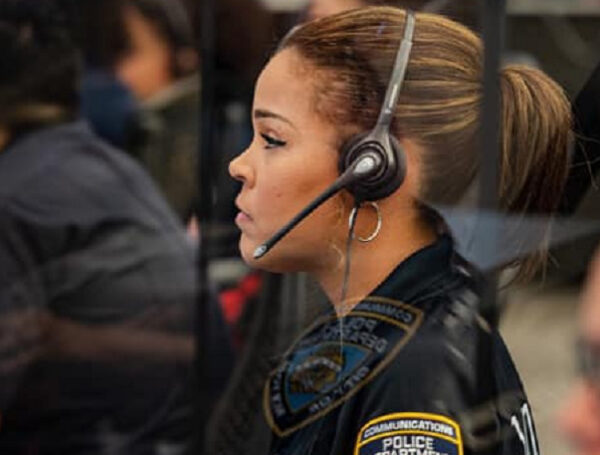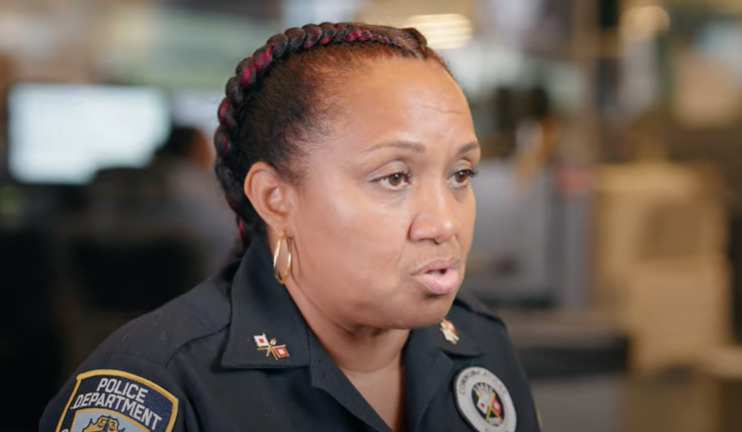
On the relevant heels of commemorating 9/11, there is so much to explore —even after two decades— pertaining to the vast human resources involved in mitigating the diabolical attack on iconic symbols in America, resulting in massive loss of life. Each year on September 11, we see more first responders and hear of more heroic feats performed by people whose stamina was battle-tested and galvanized, epitomizing our nation’s minority of humans who occupy the role of one of the most stressful occupations on the planet.
In a categorical and literal behind-the-scenes perspective, today we herald the unseen people whose voices are the very first ones we hear when we send out a mayday: Police dispatchers.
Specifically relating to the World Trade Center apocalypse in September 2001, at no time in history was the NYPD civilian cadre of emergency call takers so tasked with and tested by an enormously unwieldy and untenable catastrophe. Nevertheless, they managed as best possible under surreal circumstances.
Per a NYPD career posting, their 911 operators are classified as Police Communications Technicians “assigned to the department’s Communications Section as 911 emergency call takers” serving as “radio dispatchers of police services and perform all other clerical and administrative duties related to the provision of emergency service.”
Having been one in a police agency in Florida before I was sworn as a law enforcement officer, the “clerical and administrative” part refers to tons of paperwork and constant attention to computer correspondence with myriad authorities in a vast criminal justice network engendering local, county, state and federal agencies, mostly law enforcement ones.
Locating warrants, stolen vehicles/weapons “hits” and missing persons, then confirming the validity of each by respective agencies which officiated the criminal justice-related data, was/is a static duty for police dispatchers. Per statutory stipulations, beyond detainment, no one can be taken into custody until the originating agency confirms the “active status” and, if in a geographically distant jurisdiction, their intent to extradite (when it is for a wanted fugitive). That’s just a small unpacking of what clerical and administrative equates to for civilian public safety personnel operating in the agency’s Communications Center.
Although I can only hazard to guess the answer, how NYPD Police Communications Technicians somehow managed to balance all hell breaking loose at the World Trade Center while still fulfilling these admin tasks underscores their imperative role and epitomizes requisite ambidexterity among emergency service dispatchers.
No matter how (if) they managed to facilitate business as usual in grossly unusual circumstances, with abundant abruptness…the impromptu challenges were gargantuan, monstrous, and required all-hands-on-deck to swiftly reprioritize mindsets to carry out duties, responsibilities, and efforts without ideal blueprints in the police playbook.
Watching historical and newer footage and interviews by police personnel involved, I was riveted by revelations spoken by a handful of the NYPD’s public safety dispatchers, some of whom attest they lost family and friends at Ground Zero. Confirmation that they also lost colleagues tolled as the ash and soot settled.
Now that pretentious, scandalous, corrupt, truth-bending Andrew Cuomo is no longer New York State governor, his successor seems to have a different view of public safety and its dutiful agents who carry out the mitigation efforts on behalf of citizen safety and sanctity.
On September 11, 2021, newly-sworn-in NY Governor Kathy Hochul signed the “First Responders in Communications” bill at the Jacob Javitz Center in Manhattan, a one-time target of terrorists with designs to reduce the massive complex to smithereens.
According to the NY Daily News, “There are thousands of 911 dispatchers and operators spread throughout the state but unlike firefighters, police officers and medics, they have never had the official first responder classification.”
An excerpt taken from the New York state Senate version of the bill reads: “Granting these frontline heroes the designation of ‘First Responders in Communications’ will demonstrate New York State’s respect for these workers while serving to boost morale, open training opportunities, and increase access to mental health treatment options, all of which have been proven effective in reducing attrition and turnover.”
Daily News reporters wrote that the long-overdue bill would “give [public safety communications] workers better access to federal grants and other financial support to improve training, equipment, morale and retention.”
In a statement made by Suffolk County Association of Municipal Employees union President Daniel Levler, he hit a grand slam for the 300 or so 911 operators and emergency dispatchers he represents when he said:
“Emergency Operators and Dispatchers are undoubtedly the first responders of first responders, serving at the center of emergency events, twenty-four hours a day, seven days a week, [365 days per year]. These essential workers exercise quick-thinking, counseling, and guidance that frequently makes the critical difference between life and death before help arrives.”
That’s a definitive statement appropriately heralding behind-the-scenes public safety personnel who serve facelessly but with a voice anyone in dire straits longs for…that initial link indicating resolution is rolling.
In a 2021 production called “Turning Point: 9/11 and the War on Terror,” the docuseries traversing the many details surrounding 9/11 and pivotal personnel involved is aptly titled “The System Was Blinking Red.”
Although that title is derived from spoken words from a now-retired high-ranking U.S. intelligence officer talking about the warnings and red flags regarding terrorists’ operations and their plans to attack American landmarks/assets, the same barometer exists within police communications centers in which dispatchers sit inordinately before walls of computer screens and banks of blinking lights denoting calls for help.
When a major incident erupts (ie.: active shooter), the phone system is hot and heavy and unrelenting, clogged with callers screaming at octaves which police dispatchers try to decipher, decode, and launch street-beat personnel and apparatus.
The following brief video exhibits a compilation of actual NYPD dispatchers who were on duty and mitigating the tsunami of emergency traffic on September 11, 2001:
Imagine taking a job where you know the role is to be the person receiving bad news throughout your shift. When I was hired for such a role years ago, they called it the “hot seat.” I share with you that on many occasions that hot seat stewed me physically, mentally, and emotionally. My resignation was in an envelope sooner than later, but I stayed with it for a handful of years, a dividend reinvested in my subsequent sworn police career (exposed to both sides of the biz).
I recall a hallway lecture from a police communications supervisor who, while I was prepping my application to be a dispatcher, candidly shared that most public safety dispatchers last only about two years, that the turnover rate is enormous, that chronic stress must have reasonable outlets. I found that to be accurate in terms of astronomic stress and many cohorts who came and went before the lockers were even scantly filled with personals.
I suspect the turnover today is not much different. Over the last decade or so, media reports published crises pertaining to shortages of police dispatcher candidates. Personally and anecdotally, it is not hard to imagine such stark occupational circumstances challenging people to step up, take the hot seat, grab the mic, and coordinate order in impromptu fashion while using one’s imagination to form images of what must be going on at actual scenes out on the streets.
As NYPD police communications technician Monique Brown said in a post-incident interview, “We can’t see…we can only go by what they are telling us.” She is referring to both cops working the scene and/or callers conveying hysterically via 9-1-1 lines.

In emergency communications centers, there are usually no windows. By design, distractions must be preempted (we’re only human). Acute focus is everything. No room for error. Akin to sworn cops.
Despite the compelling reasons to be a short-lived gig, anomalies exist; a scant percentage of public safety dispatchers actually make a career filling the role for two, maybe three decades. As expressed, though, telecommunicators’ tenures are usually short-lived—burnout ensues, people move on to more settled occupations, rekindling physiology as a paramount focal point eyeing longitudinal futures.
However brief the tenure may be, the job must be done. Chiefs, sheriffs, command staff, street supervisors, even some elected officials often recognize the imperative work performed by public safety dispatchers, often catering foodstuffs and soft drinks as a gesture of appreciation spread out across any makeshift placemat in the Comm Center. And it’s not just during National Public Safety Telecommunicators Week.
As for 9/11 relevance influencing our topic today, although it has been long in the making and 20 years since the pinnacle of proof tipping the scales favorably, the NYPD’s public safety dispatchers deserve accolades in accordance with, as Mr. Levler coined, “first responders of first responders” distinction.
Thank goodness we have brave, compassionate, sympathetic, empathetic souls stepping forward, sitting down, and plugging in to respond to our maydays…
In the realm of icons, LEOs’ are represented by the Thin Blue Line. Public safety dispatchers stand on the Thin Gold Line and have hearts of gold to reflect that fact…toeing the lifeline for cops and citizens alike.